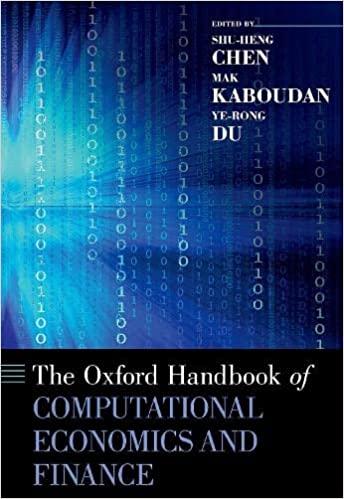Question
1. (6) If you invest 100.00 at 6% compounded monthly for 5 years you will end up with $134.89. (trust me on this one). What
1. (6) If you invest 100.00 at 6% compounded monthly for 5 years you will end up with $134.89. (trust me on this one). What happens to the value at the end of 5 years if you compound yearly rather than monthly (will the answer be larger or smaller and explain why this happens)?
2.a. (6) In general, what is the current financial health of the U.S. Farming Industry? What factors commonly contribute to differences between the more profitable farms and those farms consistently struggle financially over time? What are some factors that could positively influence the financial health of the U.S. Farming industry in the next few years?
3. (5) When you issue a corporate bond, do you borrow money from the buyer, or sell an ownership interest in your company to the buyer, or neither? Assume that a traditional U.S. bond has several years left to maturity and pays a coupon rate that is significantly lower than current prevailing interest rates. Would the current market value of the bond be higher, or lower than the face value of the bond, and why?
4. (2) When you sell stock in your company, do you borrow money from the buyer, or sell an ownership interest in your company to the buyer, or neither?
5. (3) Explain why it might be important to consider finance (TVM) concepts when applying profit maximization rules like MC=MR to processes that take a lot of time, like farming?
6. (7) If a corporate company has a projected net return after taxes of $60.00 per share and prevailing interest rates are 5% annual, what simple process would determine the current stock price per share? Calculate that value. What would happen to the value you just calculated if prevailing interest rates rise substantially? What would happen to the value you just calculated if net return expectations were suddenly expected to decline substantially?
7. (2) Assume that you just calculated a Future Value based on a single amount present value, an assumed interest rate, and an assumed number of time periods and compounding frequency. How would your answer change (higher or lower end value) if you suddenly realize that the interest rate expectation should be lower?
Step by Step Solution
There are 3 Steps involved in it
Step: 1

Get Instant Access to Expert-Tailored Solutions
See step-by-step solutions with expert insights and AI powered tools for academic success
Step: 2

Step: 3

Ace Your Homework with AI
Get the answers you need in no time with our AI-driven, step-by-step assistance
Get Started


